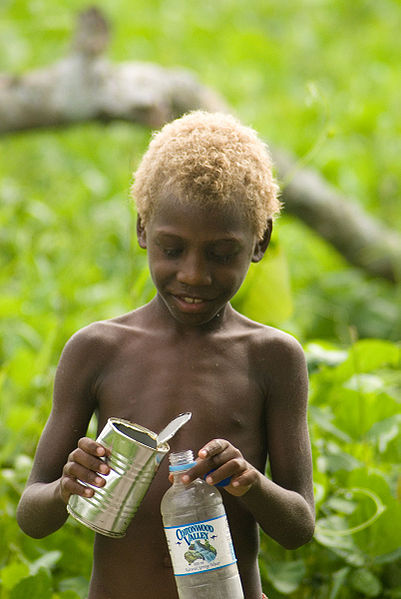General Discussion
Related: Editorials & Other Articles, Issue Forums, Alliance Forums, Region ForumsAnother Genetic Quirk of the Solomon Islands: Blond Hair
By SINDYA N. BHANOO
Published: May 3, 2012
In the Solomon Islands, about 10 percent of the dark-skinned indigenous people have strikingly blond hair. Some islanders theorize that the coloring could be a result of excess sun exposure, or a diet rich in fish. Another explanation is that the blondness was inherited from distant ancestors — European traders and explorers who came to the islands.
<snip>
But that’s not the case, researchers now report. The gene variant responsible for blond hair in the islanders is distinctly different from the gene that causes blond hair in Europeans.
“For me it breaks down any kind of simple notions you might have about race,” said Carlos Bustamante, a geneticist at Stanford University. “Humans are beautifully diverse, and this is just the tip of the iceberg.”
<snip>
The researchers also found that the variant of TYRP1 that causes blond hair in Solomon Islanders is entirely absent in the genomes of Europeans.
<snip>
http://www.nytimes.com/2012/05/08/science/another-genetic-quirk-of-the-solomon-islands-blond-hair.html?_r=1
virgogal
(10,178 posts)hlthe2b
(113,510 posts)One might wonder what evolutionary advantage it would have for these Pacific Islanders.
surrealAmerican
(11,825 posts)... but just not be a disadvantage. After all, only 10% of the population is blond. If it were an advantage (to the individual), that percentage would probably be higher.
hlthe2b
(113,510 posts)Still, in the tropics, blonde hair might be expected to confer some disadvantage with respect to skin cancer to the scalp>
csziggy
(34,189 posts)So if there is an increased chance of cancer, it may not be enough of a disadvantage for survival of the genes for that trait.
hlthe2b
(113,510 posts)csziggy
(34,189 posts)As blondes from Northern climates.
I breed horses for color - dun, buckskin, grulla. The genes for producing the horses with gold to cream bodies with dark or red points (legs, mane & tail) are varied. Some, such as true duns, produce horses with black skin, brown eyes, and gold to cream hair color and do not have a cancer risk. Others, such as the 'champagne' genes, produce horses with similar hair colors, but the eyes are amber or blue and the skin is mottled pink and black. I am not aware of an increased incidence of cancer in either group above the average in horses.
In horses, the highest incident of cancer is in gray horses. They can be born any color but will turn gray gradually over a number of years and eventually turn white or close to white - some grays are 'flea bitten' with mostly white coats and little dots of colored hair scattered through their white hairs. Their skin color is more dependent on their original coat color, so can be black, pink, spotted, or mottled. I am not sure if gray horses with pink or mottled skins have a higher incidence of cancer than those with black skin.
Just having a lighter coat color or skin color may not be the factor that increases skin cancer - it may just be the genetics of the Northern European blondes (and redheads and fair skinned people) that give them an increased rate of cancer when exposed to the sun.
4th law of robotics
(6,801 posts)they say it's a different mutation from the ones Europeans have.
Ok, but if it is also caused by a recessive allele (I didn't see that in the article) that means that to have 10% of the population expressing it about 42% of the population is carrying but not expressing this trait (assuming there is no selection against the heterozygous folks).
That's remarkably high for a random mutation if it has no selective pressure on it.
It would be interesting to find out when it started in relation to when the island was settled. If it just happens that one of the islands original families had it and they had a small starting population with limited immigration/selection it could simply be a founder-effect.
If it happened later that would suggest it is being selected for.
Of course if it's a dominate mutation then that changes things entirely. But typically dark hair is dominant to all other types.
Retrograde
(11,406 posts)Genes mutate all the time, more or less randomly. Most mutations are harmful for the individual, some are neutral, a few confer some benefit that may make them more likely to reproduce. If the mutated individual passes on its genes they stay in the gene pool. If the mutation lets the individual stay alive long enough to reproduce it doesn't matter if it will have adverse effects on its post-reproductive life. There's no overall pre-ordained plan or direction.
hlthe2b
(113,510 posts)it is a long-lived mutation that generally speaking might be expected to have conferred some advantage. Might.
csziggy
(34,189 posts)Even in a culture/population that is primarily dark haired, light hair could be more sexually attractive.
AngryAmish
(25,704 posts)Peacock tails and all that.
DefenseLawyer
(11,101 posts)Gormy Cuss
(30,884 posts)xchrom
(108,903 posts)And red? Hair - I believe.
HiPointDem
(20,729 posts)
australia

vanatu
Oceania
Aboriginal Australians, especially in the west-central parts of the continent, have a high frequency of natural blond-to-brown hair,[33] with as many as 90–100% of children having blond hair in some areas.[34] The trait among Indigenous Australians is primarily associated with children. In maturity the hair usually turns a darker brown color, but sometimes remains blond.[34] Blondness is also found in some other parts of the South Pacific, such as the Solomon Islands, Vanuatu, and Fiji, again with higher incidences in children.
http://en.wikipedia.org/wiki/Blond
possibly the same gene showing genetic relationship between pacific peoples?
MineralMan
(151,043 posts)were had blond hair, and this is a very interesting genetic quirk. Science is good!